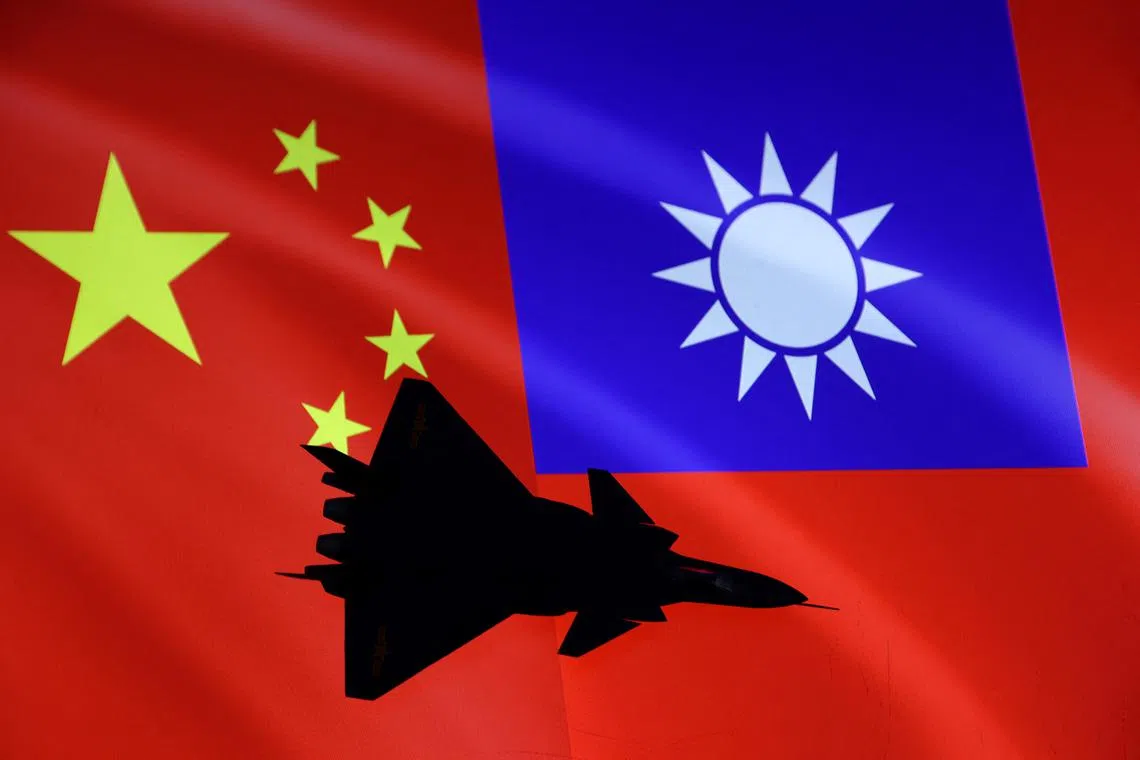Taiwan details record surge in planes in China’s war games, flags risk to region
Sign up now: Get insights on Asia's fast-moving developments

China held a single day of what it called “Joint Sword-2024B“ drills on Oct 14 as a warning against “separatist acts“.
PHOTO: REUTERS
TAIPEI - China used a record 153 military aircraft in war games around Taiwan, the island’s government said on Oct 15, adding that such drills without prior warning were a danger to the entire region.
The one-day drill, designated “Joint Sword-2024B”
The drills were not a concern only for Taiwan, but risked destabilising the region, Premier Cho Jung-tai said.
“Any drills without prior warning will cause great disturbance to peace and stability in the entire region,” he told reporters in Taipei.
“China’s drills affect not only Taiwan’s neighbourhood, but also seriously affect the entire international navigational rights and air and sea space, so attracted the attention of other countries.”
In a daily update on Chinese military activity around the island in the previous 24 hours, Taiwan’s Defence Ministry said it spotted 153 military aircraft. It had already described the number of aircraft as a one-day record by the afternoon of Oct 14 when it spotted 125.
A ministry map showed 28 of those aircraft had crossed the sensitive median line of the Taiwan Strait, which had previously served as an unofficial barrier but which China says it does not recognise.
Other areas that saw activity were waters off the island’s south-eastern coast, home to a major Taiwan airbase, and to its south-west, at the top part of the South China Sea, site of the Taiwan-controlled Pratas Islands.
Also spotted were 14 ships of the Chinese navy and 12 “official” vessels, the ministry said, referring to ships of the coast guard and similar agencies.
China’s drills prompted concern from the US and its allies, with the Pentagon slamming them as “irresponsible, disproportionate and destabilising”.
Taiwan has complained of almost-daily Chinese military activity nearby in the past five years, and China has now held at least four rounds of large-scale war games since 2022.
Taiwan rejects Beijing’s territorial claims, saying only the island’s people can decide their future.
China’s pressure attempts had only solidified support for Taipei, said Ms Kuan Bi-ling, head of Taiwan’s Ocean Affairs Council, which runs the coast guard.
“China’s exercise, while intended to put military pressure on Taiwan and the international community, has backfired and led to greater international solidarity against China’s expansionist behaviour,” she wrote on her Facebook page.
“Cross-strait relations are no longer just cross-strait relations; they are now at the heart of international relations in the Indo-Pacific.”
Taiwan did not report just military manoeuvres.
The investigation bureau of its Justice Ministry said it had found several false online reports, such as untrue assertions of Taiwan’s military failing to respond quickly and that ships carrying liquefied natural gas had been forced to turn around.
The messages constituted “cognitive manipulation” by “overseas hacking armies”, which stole or hacked into social media pages, the bureau said in a statement on Oct 15 without directly blaming China.
Speaking during a visit to the Taiwan-controlled Matsu islands, which sit opposite China’s Fuzhou city and where the Chinese coast guard faced off with Taiwan ships during drills on Oct 14, a senior Taiwan official said China needed to think about what kind of country it wanted to be.
“Mainland China should become a civilised power in the world, be a friend, not an enemy, and be liked by everyone, not feared by them,” said Mr Luo Wen-jia, head of Taiwan’s Straits Exchange Foundation, a semi-official body that deals with day-to-day issues between the two sides of the strait.
Beijing’s war games have not caused alarm for most Taiwanese, who have been accustomed to a latent threat of attack since 1949, when the defeated Republic of China government fled to the island after losing a civil war to Mao Zedong’s communists.
Taiwan’s benchmark stock index closed up 0.3 per cent on Oct 14, and up 1.4 per cent on Oct 15, ahead of expected stellar third-quarter earnings on Oct 17 by chipmaker Taiwan Semiconductor Manufacturing Co. REUTERS


